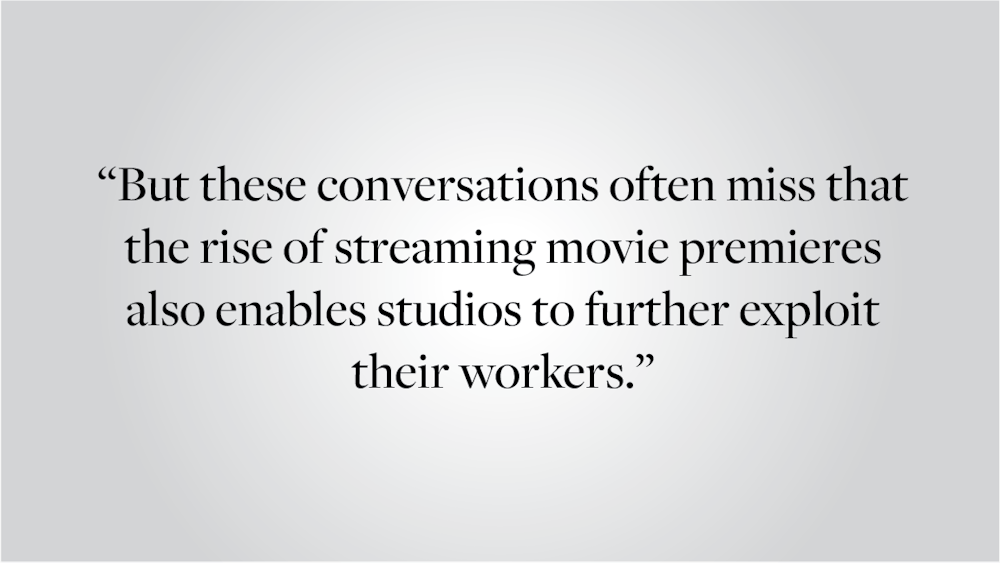After three release delays spanning almost a year, Denis Villeneuve’s adaptation of the sweeping sci-fi epic, "Dune," finally opened this past weekend. General anticipation among film enthusiasts was sky high for the movie that promised to do the famously impossible task of putting Frank Herbert’s classic book to screen. With a cast straight out of FilmTok and Villeneuve floating plans for a sequel before the film was even released, Dune was practically a guaranteed cultural success.
Now, the film is out — with one caveat. The production studio behind the project, Warner Brothers, has slated its entire 2021 lineup to simultaneously premier both in the theater and on its streaming site, HBO Max. In an attempt to compensate for underperforming box office sales, production giants like Disney popularized the strategy of releasing films over streaming services concurrently with theatrical releases to capitalize on the high monthly streaming fees. In the discourse surrounding these decisions, the qualms taking center stage focus on how theaters will suffer and, consequently, the magic of the moviegoing experience will be lost. But these conversations often miss that the rise of streaming movie premieres also enables studios to further exploit their workers.
Take Scarlett Johansson’s high-profile lawsuit against Disney, for example. The actor claimed the studio breached her Black Widow contract by releasing the film simultaneously in theaters and on Disney+ in an effort to promote the streaming platform. This essentially guaranteed that the movie would net less profit at the box office, reducing the bonuses that the studio must contractually pay Johansson.
Johansson is plenty wealthy, but her suit is emblematic of the neglect of workers across all levels of the industry. If an actress who was the single highest-paid female actor in 2019 is vulnerable to this sort of exploitation, imagine the difficulty of workers without the cultural and capital clout to bargain their way out. The debacle ended in an undisclosed settlement, failing to produce the ripple effect of increased worker protections that some anticipated. Instead, the episode belied that the wealth of such a large studio essentially provides a blank check for producers and executives to mistreat their workers as they please.
The streaming boom has studios pushing out a higher volume of content faster than ever, often necessitating 12- to 18-hour work days from crew members with no guaranteed weekend breaks. And just like in Johansson’s suit, there’s a critical loss in compensation. Broadcast shows often continue to earn past their premiere date through residuals, the fees that channels pay to show reruns. These fees fund health and pension plans for below-the-line workers, whereas directors and actors get a straight check. Not only do shows produced for streaming services yield fewer residuals, they also limit pension benefits due to their classification as “new media.”
Hollywood’s labor force is vocal about streaming pushing them to the breaking point. “Workers on certain ‘new media’ streaming projects get paid less, even on productions with budgets that rival or exceed those of traditionally released blockbusters,” according to a list of grievances from The International Alliance of Theatrical Stage Employees, who recently threatened the largest strike in Hollywood history in protest of grueling work hours, abuse on set and low wages. And, vitally, Hollywood crew members who do not have Johansson’s cultural and financial leverage must resort to collective measures — strikes like these are one of their only recourses to unfair working conditions.
And what demand does this glut of streaming releases actually meet? What do I get out of watching Timothée Chalamet ride a sandworm on a 13-inch laptop screen? WarnerMedia’s CEO Jason Kilar said, “If we start our days and end our days focused on the customer, we’re going to lead the industry.” But this corporate messaging tries to sell a kind of convenience nobody ever asked for, betraying an ethos that reduces film production and distribution to a matter of sheer volume. There is no longer even the pretense that studios like Warner and Disney view film as an inherently experiential art form. I can’t help but agree with Denis Villeneuve’s repudiation of Warner Brothers’ decision to premiere Dune on HBO Max: “There is absolutely no love for cinema, nor for the audience here.” To these studios, movies are undeniably products, through and through.
When it comes to products, convenience rules the day. Streaming has ushered in a level of consumptive ease so total and unprecedented that, just like with Amazon Prime Delivery, we will become reliant upon this instant consumption. And the usual labor fallout will inevitably follow: crushed unions, compromised worker health and safety and diminished product quality — in this case, our movies. In this labor-hostile climate, it is imperative that any organized action is met with urgency and support. The majority of Hollywood’s workforce already has grueling, thankless jobs. For their sake, leave the sandworms for the silver screen.
Isabella Levine ’23 can be reached at isabella_levine@brown.edu. Please send responses to this opinion to letters@browndailyherald.com and other op-eds to opinions@browndailyherald.com.





